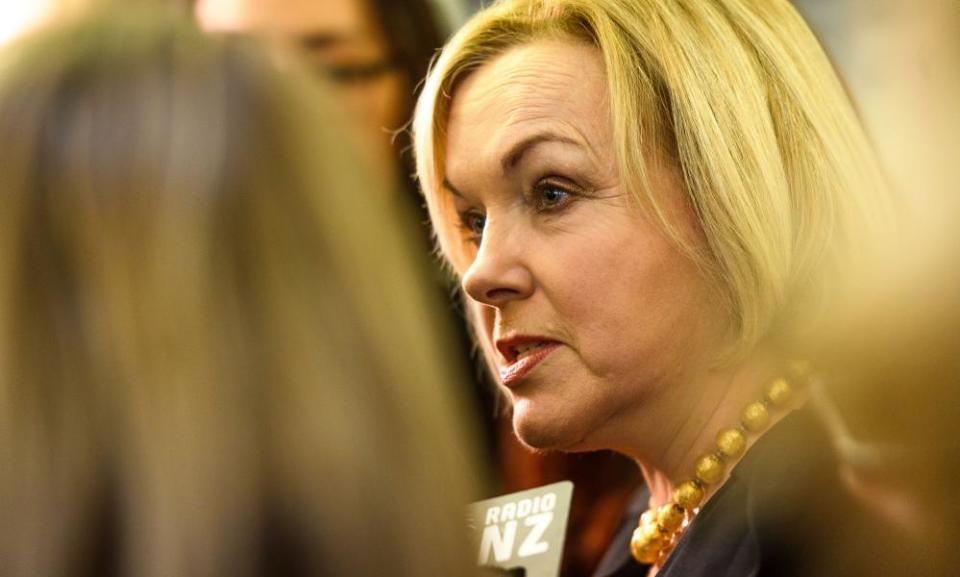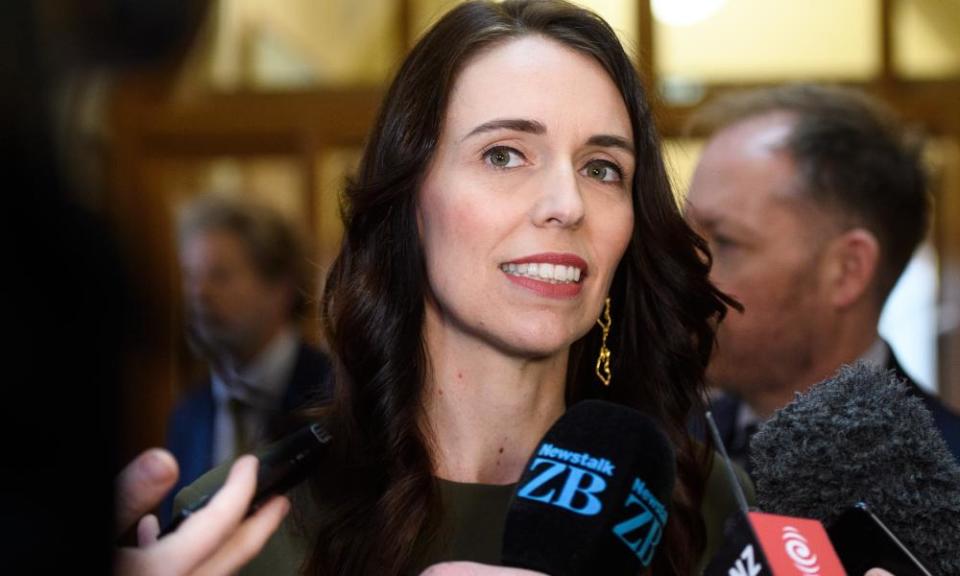New Zealand opposition in disarray as election nears – can 'Crusher' Collins fix it?

With an arched eyebrow and a ready stash of her sardonic remarks – “if life was fair I’d be 5’10” and a gorgeous Slovakian model” – Judith Collins confidently assumed leadership of New Zealand’s centre-right opposition party.
A politician whose leadership ambitions have been stymied for years, she was, commentators said, the only chance to turn around the flagging fortunes of the National party against the juggernaut of Jacinda Ardern, the wildly popular Labour prime minister, with an election less than two months away.
But that was last week. On Monday, the new leader was thrust into a horror scenario when one of her MPs said he would not stand for re-election, citing mental health concerns – only for allegations of sexting to emerge hours later . The police are investigating Andrew Falloon’s actions, and he has left Parliament.
Scarcely more than a day later, Collins appeared to have prompted the sacking of a government minister herself by disclosing to Ardern that Labour politician Iain Lees-Galloway had had an affair with a former office staffer who had also worked at an agency he managed.
Related: Two sex scandals in a week: New Zealand faces reckoning over MPs' behaviour
The public popularity of Collins – nicknamed “Crusher Collins” for her desire to destroy the cherished cars of boy racers and someone who has long proved divisive, even within her own party – remains difficult to gauge because a poll has not yet been conducted during her one-and-a-half-week tenure.
David Cormack, a managing partner at a communications firm who formerly worked for the left-leaning Green party, said: “She’s made all the right noises and said all the right things to shore up the National party base, but we don’t know how much the National party base sits at now.”
Collins’s hand in the resignation of Iain Lees-Galloway – the Labour workplace relations minister found to have had an affair with a former staffer – further muddied the waters in terms of polling, Cormack said.
The country’s last major poll was taken in June, the month after Collins’s predecessor, Todd Muller, took over the party, following his ousting of the deeply unpopular Simon Bridges in a political coup. Under the leadership of Muller – who abruptly quit last week, citing ill-health – the party rose nine points to 38%, still languishing behind Labour’s 50% under Ardern.
It remained to be seen whether voters would punish National – or both parties – for the week’s scandals, even though both were vastly different in their severity, said Cormack. “It could just confirm in everyone’s mind that all politicians are scummy,” he said. “That could depress voter turnout.”
‘A Ship of Theseus problem’
The Falloon allegations were not Collins’s only problem. Since assuming the leadership, she has been forced to mop up the remainder of a scandal that appeared to have played a part in Muller’s downfall. A first-term MP, Hamish Walker, had leaked private information about Covid-19 patients to reporters and resigned after it was revealed; Collins has also demoted a veteran MP who admitted he also had access to the information.
Analysts said she had acted decisively with the demotion but since her ascension two of the highest profile members of Muller’s inner circle have also resigned, joining a sizeable group of 13 National MPs who will not stand again at September’s election. The party brought 56 MPs into parliament in 2017.
“When you examine each of the departures individually they all make sense,” said Ben Thomas, a public relations consultant and former National government staffer. “But when you start looking at all of that together it starts looking like a sort of a Ship of Theseus problem.”

“At what point do you say it’s still your grandfather’s axe when you’ve replaced the handle and the blade?” he said, referring to the impending departures of several experienced, senior politicians who formed part of National’s long-serving previous government before Ardern took over.
There was “no question that the National party lineup looks weaker now” than it did two weeks ago, Thomas added.
Cormack said Collins had not yet been able to send her own message to the electorate about why she should lead the country instead of Ardern, busy as she had been with the problems in her own party.
Richard Shaw, a politics professor at Massey University, predicted it would not be easy for the party to move on in the eyes of the public – particularly, he said when the previous leader’s abrupt resignation had not yet entirely been explained, and questions remained about the leaking of private health information. Voters might wonder whether more scandals would emerge, he added.
“These things will have to be teased out in the public domain and that will take days and weeks,” Shaw said. “It hurts Collins’s attempts to tell a different story.”

